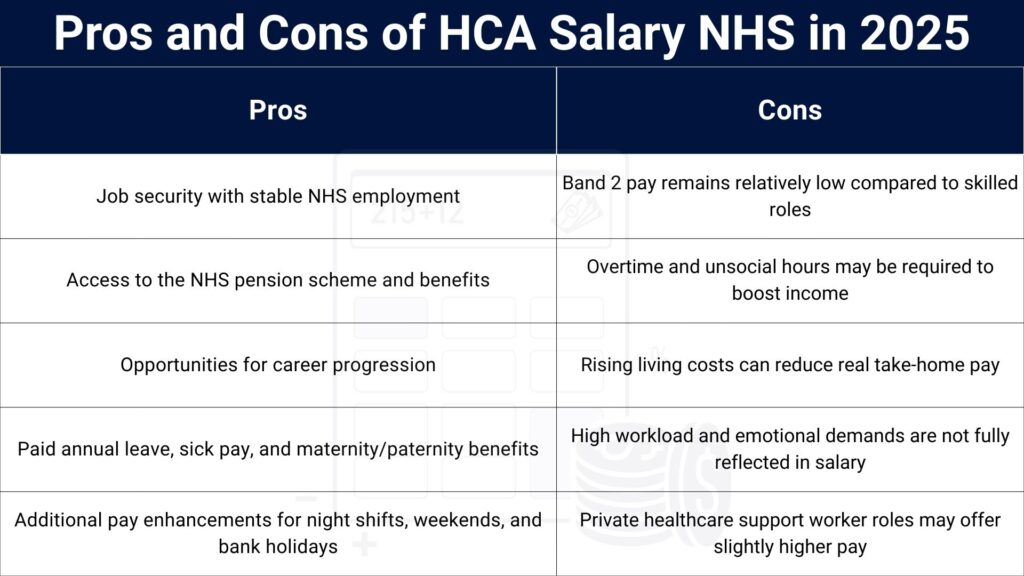NHS Healthcare Assistant (HCA) Salary in 2025
Healthcare Assistants (HCAs) play a vital role in the NHS, supporting nurses, doctors, and patients with essential day-to-day care. From monitoring vital signs to assisting with mobility and personal care, HCAs are the backbone of patient support services. As we move into 2025, many people considering or already working in this role are asking one key question: “Who is a Healthcare assistant? What is the HCA salary NHS this year?” With pay bands set under the NHS Agenda for Change framework, HCAs typically start at Band 2 NHS, though progression into higher bands is possible with experience or additional qualifications. Understanding the support worker pay NHS structure, including take-home pay, allowances, and pension deductions, is crucial for anyone planning their career in healthcare.
This guide breaks down the latest salary information for HCAs in 2025, helping you understand what you can realistically earn and how it compares to previous years.

What Does an NHS Healthcare Assistant Do?
An NHS Healthcare Assistant (HCA) works alongside nurses and other healthcare professionals to provide direct patient care and essential support. While the role does not require a nursing qualification, HCAs are critical to the smooth running of hospitals, GP practices, and community healthcare services.
Typical Duties of an HCA:
- Patient Care: Helping patients with washing, dressing, eating, and mobility.
- Monitoring Health: Checking vital signs such as temperature, pulse, and blood pressure.
- Clinical Support: Assisting nurses and doctors with treatments, tests, and equipment preparation.
- Emotional Support: Offering comfort, reassurance, and companionship to patients.
- Administrative Tasks: Updating patient records and ensuring wards or clinics are well-prepared.
HCAs often build strong relationships with patients, as they spend more direct time with them than many other healthcare professionals. This makes the role both rewarding and demanding, combining compassion with practical skills while reflecting the realities of the HCA salary NHS structure.
HCA Salary NHS: Variations, Take-Home Pay & More
While the Band 2 NHS salary sets a fixed annual pay of £24,465 in 2025, the real amount you take home each month often looks different. This is because several factors can increase or reduce your actual earnings.
1. Unsocial Hours and Enhanced Pay
Healthcare Assistants often work evenings, nights, weekends, and bank holidays. Under the NHS Agenda for Change, this qualifies for enhanced pay (also called unsocial hours pay).
- Night shifts (8 pm–6 am): Extra 30%–60% uplift on hourly rate.
- Saturdays after 8 pm & Sundays: Enhanced rates apply.
- Bank Holidays: Often double pay.
This means your support worker’s pay NHS can rise significantly if you regularly work shifts outside the standard 9–5.
2. High-Cost Area Supplements
If you’re working in London or the surrounding regions, you may qualify for an additional 5–20% of basic pay, known as a high-cost area supplement. This reflects the higher cost of living in major cities.
3. Overtime and Extra Shifts
HCAs often pick up extra shifts to increase income. Overtime is usually paid at the standard hourly rate plus enhancements, making it a common way to boost take-home pay.
4. Deductions – Pension & Tax
Your gross salary is not the same as your take-home pay. Common deductions include:
- NHS Pension Deduction – between 5.6%–14.5% depending on earnings.
- Income Tax & National Insurance (NI): Calculated via your NHS tax code (usually 1257L in 2025).
This means a Band 2 HCA earning £24,465 may take home around £1,550–£1,650 per month after tax, NI, and pension contributions.
5. Pay Progression Opportunities
Although Band 2 has no step increases, many HCAs progress into Band 3 or Band 4 roles (e.g., Senior HCA, Assistant Practitioner).
- Band 3 in 2025: £25,147 – £27,596
- Band 4 in 2025: £27,596 – £30,852
This career development can increase both salary and responsibilities.
Pros and Cons of HCA Salary NHS in 2025

Conclusion
Healthcare Assistants remain an essential part of the NHS, providing frontline care and supporting both patients and medical staff. The HCA salary NHS in 2025, particularly at Band 2, reflects steady growth but still varies depending on factors like enhancements for night shifts, weekends, and bank holidays. While base pay is modest, these additional payments can significantly increase overall take-home pay, making the role more financially rewarding.
For those considering a career as an HCA, it’s important to weigh not just the salary but also the job satisfaction, stability, and career progression opportunities within the NHS. With continued demand for patient care, HCAs remain a vital entry point into healthcare, offering both immediate employment and pathways to higher bands or nursing roles in the future.
Frequently Asked Questions:
What is the NHS Healthcare Assistant (HCA) salary in 2025?
In 2025, most NHS Healthcare Assistants are paid under Band 2, with a basic annual salary of £24,465. Actual earnings can be higher depending on unsocial hours, overtime, and location-based allowances.
What band is an NHS Healthcare Assistant on?
Most HCAs start on Band 2 under the NHS Agenda for Change pay structure. With experience, training, or additional responsibilities, HCAs can progress to Band 3 or Band 4 roles such as Senior HCA or Assistant Practitioner.
How much take-home pay does an HCA get per month?
After deductions for income tax, National Insurance, and NHS pension contributions, a Band 2 HCA earning £24,465 typically takes home around £1,550 to £1,650 per month, depending on pension tier and working hours.
Do NHS HCAs get paid extra for night shifts and weekends?
Yes. NHS Healthcare Assistants receive unsocial hours enhancements for working nights, weekends, and bank holidays. These enhancements can increase hourly pay by 30%–60%, with bank holidays often paid at double rate.
Can an HCA increase their salary in the NHS?
Yes. HCAs can increase their salary by working unsocial hours, taking overtime, qualifying for high-cost area supplements, or progressing into higher roles such as Band 3 or Band 4 positions, which offer higher pay and greater responsibility.
